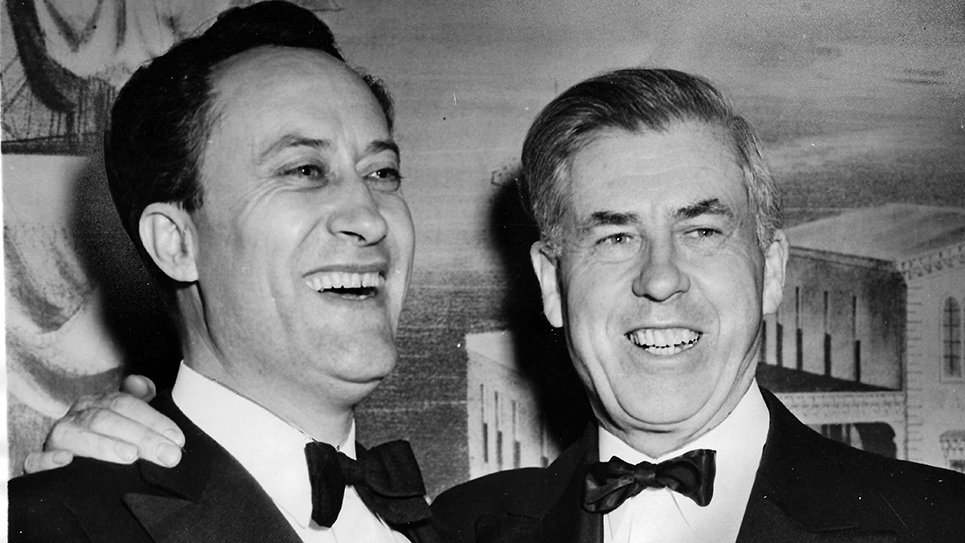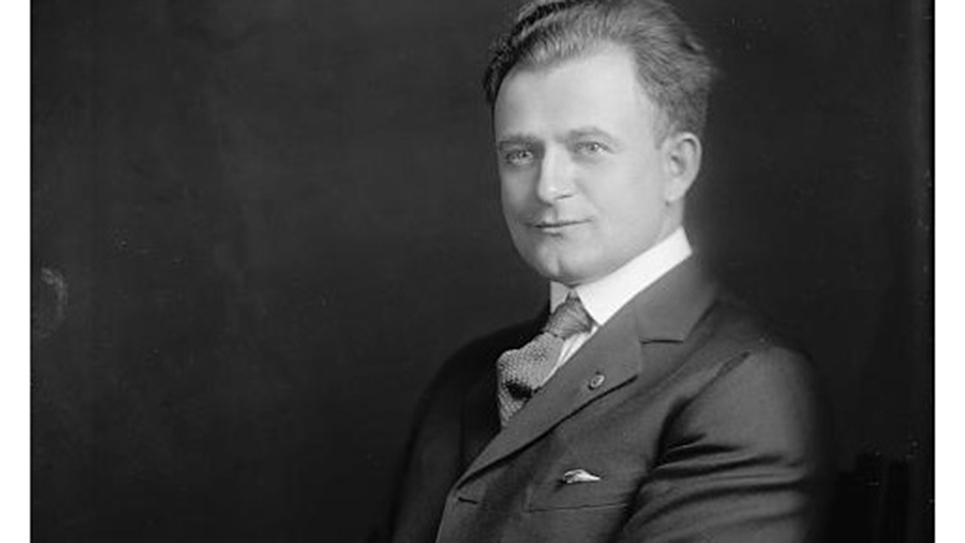Cowboy Entertainer: Glen H. Taylor of Idaho
Someone once described politics as show business for ugly people. Certainly, show business and politics are related and may very well be kissing cousins. Ronald Reagan, George Murphy, Arnold Schwarzenegger, Donald Trump, Jesse Ventura, Al Franken and Tennessee’s own Fred Thompson are all examples of entertainers becoming politicians. No state or electorate seems to be immune from the appeal of entertainers/politicians. The people of Idaho had their own in Glen H. Taylor. Taylor was a controversial figure in his state, being farther to the left than most of his contemporaries like Hubert Humphrey of Minnesota.
The bald Glen Taylor eventually became a millionaire from a business making toupees for men, “Taylor’s Toppers.” That success came after Taylor knew his time in elective office and politics was done. TIME wrote that Taylor said, “I want to go back to Washington because I want a job and I can’t find anything else to do,” which the former senator hotly denied. Taylor did find something to do with his toupee business and did some minor acting, appearing on the “Adventures of Ozzie & Harriett” and “Death Valley Days.”
Glen Hearst Taylor was not really successful, financially speaking, as an entertainer. Taylor was born the twelfth of thirteen children and arrived in the world while his family was staying at a boarding house. Taylor’s father had once been a Texas Ranger, but when Glen was born, the elder Taylor was an itinerant preacher. For years, Taylor scraped out a living as a country and western singer; it soon became a family enterprise with his wife and children joining the act. Settling in Pocatello, Taylor’s first real attempt to seek public office came in 1938 when Congressman D. Worth Clark was running for the United States Senate, leaving the seat open. Glen Taylor became a candidate for Idaho’s Second Congressional District, running in the Democratic primary. Taylor lost the Democratic nomination to Bert Miller, who had served two terms as the elected state attorney general. Taylor ran fourth. Glen Taylor was not done with politics or running for office. Perhaps his most notable characteristic was his persistence.
When Idaho’s long-serving Senator William E. Borah died in 1940, it necessitated a special election that year to fill the two years remaining in Borah’s term. John Thomas, a Republican who had served in the Senate from 1928-1933, was once again appointed by the governor to fill the vacancy. A wealthy rancher and banker, Thomas was the Republican nominee. Glen Taylor entered the Democratic primary against two other candidates and came out first with each candidate getting around a third of the votes cast. Campaigning in the general election, it became quite clear Glen H. Taylor was well to the left of Idaho’s usual Democrats. Opponents denounced Taylor as a socialist and worse. Taylor lost to Senator Thomas, although he polled more than 47% of the ballots cast.
Taylor ran again two years later when Senator John Thomas was seeking reelection to a full six-year term. Facing four opponents in the Democratic primary, Taylor yodeled his way to win the Democratic nomination with less than 32% of the vote. Taylor campaigned hard in the general election and actually ran slightly better than he had two years earlier, but still lost to Senator Thomas.
In between elections, Glen Taylor supported his family by going to California, working in war-related industries, and then coming back to campaign once again. What troubled Taylor was his baldness. Eventually, Taylor made his first crude toupee and the reaction he received from prospective voters astonished him. Taylor later recalled in his memoirs there was a noticeable difference. Outfitted with his new wig, Glen Taylor returned to Idaho for the 1944 campaign, running against Senator D. Worth Clark in the Democratic primary. Clark had been one of the more outspoken anti-interventionists inside the Senate and much of the news media of the day labeled him an “isolationist.” Clark had promised to be an independent voice in the Senate, always doing what was best for Idaho. The senator kept his word and some Democrats in the Gem State resented Clark’s failure to fully back President Roosevelt. Although Senator Clark faced three challengers, Glen Taylor’s constant campaigning gave him name recognition. Taylor edged out D. Worth Clark by 216 votes to become the Democratic nominee for the U.S. Senate in Idaho.
At the time, few political observers gave Taylor much chance of winning the general election as the Republicans had nominated popular Governor C. A. Bottolfsen. Much of the fall campaign was spent by Democrats in Idaho painting “Bott” as a “complete isolationist.” That same label had hurt Senator Clark and was calculated to injure the governor’s senatorial bid. Taylor ran advertisements proclaiming in bold letters, “NO STRINGS ON HIM!” Those same ads declared Taylor was not controlled “by the corporations.”
The Democratic ticket was aided by the fact President Franklin Roosevelt once again headed the ballot. Idaho voted for FDR and Democrats swept every office, save for GOP Congressman Henry Dworshak. Glen Taylor edged out Governor Bottolfsen to win a seat in the U.S. Senate. Taylor had noted voters didn’t seem to have much use for bald politicians and his victory in 1944 came after he campaigned in his newly crafted hairpiece. Perhaps it was the hair.
Taylor and his family headed for Washington. For Glen Taylor, who had never traveled east of Chicago, it had to be the crowning glory of his life. When the Taylor family arrived in Washington, D.C., they discovered there was a severe housing crisis in the Capitol area. The shortage of housing made it very difficult for the Taylors to find a place to live. To illustrate his family’s plight, the Taylors stood outside the Capitol singing, to the tune of “Home on the Range,” “Oh give us a home, near the Capitol dome, with a yard for two children to play … “ Taylor naturally brought his horse, Nugget, to Washington with him and delighted newsmen by riding up the steps of the Capitol. Many residents of Idaho were less delighted, and the newly elected senator began to gain a reputation for being rather eccentric, or a shameless seeker of attention and publicity, or perhaps both.
Once elected to the United States Senate, Taylor complained about the cost of living in Washington, D.C., which included a house he had purchased for his family. Taylor described the home as “nothing fancy.” “I do not believe that the people of Idaho expect me to go into debt,” Taylor groused. Glen Taylor was open in his support for better pay for members of Congress.
One thing became clear about Glen H. Taylor very quickly: he was less a politician than a showman. Having beaten an incumbent from his own party in the 1944 primary, Taylor did little to soothe the feelings of D. Worth Clark’s supporters. When Senator John Thomas died in 1945, Governor Charles Gossett, a Democrat, resigned so that Acting Governor Arnold Williams could appoint him to the senatorial vacancy. While many voters resented, as they always do, a governor having himself appointed to the Senate, Taylor did not hesitate to criticize his new colleague. Relations between Idaho’s two United States senators never improved. Gossett had to run in a 1946 special election for the remaining two years of John Thomas’s term and faced a strong challenge inside the Democratic primary from state Senator George Donart. Glen Taylor openly backed Donart against Senator Gossett; moreover, Taylor denounced Gossett as a “conservative” who might as well have been a Republican. Gossett’s having himself appointed to the Senate didn’t sit well with most Idaho Democrats and he lost decisively to Donart, who then lost the general election to Republican Congressman Henry Dworshak.
Two years later, the Democratic Party was profoundly fragmented. Former Vice President Henry A. Wallace was named Secretary of Commerce by President Roosevelt as a consolation after FDR booted him from the presidential ticket in favor of Harry Truman. Roosevelt died after three months of serving a new four-year term and Wallace would have been less than human had he not resented his successor and thought of what might have been. The scrappy little man from Missouri, unlike Roosevelt, had little tolerance for those officials who did not comply with his administration’s policies. Wallace kept making speeches on foreign policy, an odd topic for a Secretary of Commerce and was critical of the Truman foreign policy. Wallace received a stern warning but persisted, which caused Truman to fire him. Wallace was especially antagonistic toward Truman’s “get tough” policy with the Soviet Union, particularly as the Soviets seemed incapable or unwilling to keep any agreement they made with other countries. Wallace led a splinter group of leftists out of the Democratic Party to form the Progressive Party to run in the 1948 presidential election. Senator Glen H. Taylor accepted Wallace’s invitation to run as the ticket’s vice-presidential candidate. There is good reason to believe the Progressive Party was deeply infiltrated by Communists; indeed, Wallace’s long-time assistant and 1948 campaign manager C. B. “Beanie” Baldwin was a secret member of the Communist Party.
Following his apostasy of having left the Democratic Party in 1948, a sheepish Senator Glen Taylor finally decided to visit the White House to belatedly congratulate the winner of the election: President Harry Truman. Taylor’s visit occurred eleven months after the 1948 general election. Taylor was beginning to think about his own anticipated reelection campaign the following year and had good reason to believe he would face strong challenges in both the primary and general elections. “I am not a member of the Progressive Party anymore,” Taylor told reporters. As to Truman’s attitude, Taylor murmured, “He’s a good sport … he didn’t rub it in.”
If Harry Truman didn’t rub it in, the president’s attitude toward Glen Taylor had not improved. Senator Taylor went home to Idaho to campaign for reelection in 1950 and faced the man he had beaten to get to the United States Senate: former Senator D. Worth Clark. The campaign was less about Clark than it was about Taylor’s six years in the U.S. Senate. Many Democrats remained angry and unforgiving of his having left their party to run with Henry Wallace. Taylor was anathema to Republicans and the leading candidate for the GOP senatorial nomination, one-time Hollywood lawyer Herman Welker, campaigned in the primary not against his rivals, but rather the sitting senator. Welker stated he was running for the Senate to “relieve Idaho of the embarrassment of Glen H. Taylor.”
Many Idaho Democrats believed Glen H. Taylor to be an irredeemable leftist unworthy of a seat in the United States Senate; others thought Taylor was a man of the people. The conservative D. Worth Clark was able to vindicate his 1944 loss by beating Taylor for the Democratic nomination in 1950 by 948 votes. Clark went on to a crushing defeat in the general election, losing to the far more conservative Herman Welker.
Glen Taylor tried for a political comeback in 1954 when he ran yet again for the U.S. Senate. Taylor won the Democratic primary and faced GOP Senator Henry Dworshak in the general election. Dworshak was the antithesis of Glen Taylor: methodical, colorless and a workhorse rather than a show horse. Senator Dworshak beat the stuffing out of Taylor, who got just over 37% of the ballots cast.
Taylor made one last try to return to the Senate when he entered the 1956 Democratic primary. The former senator was nudged out by Frank Church who won the nomination by 200 votes. After a failed write-in effort for the general election, Glen Taylor finally realized his moment in the political sun was done. Taylor and his family relocated permanently to California where he became wealthy from his business.
The former senator died on April 28, 1984.
© 2024 Ray Hill







